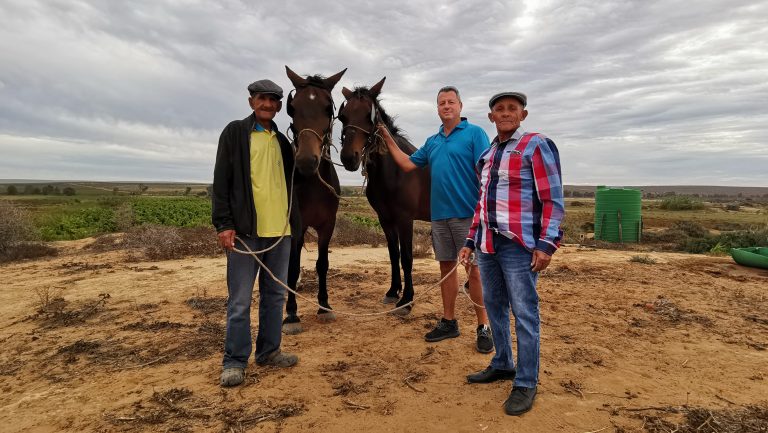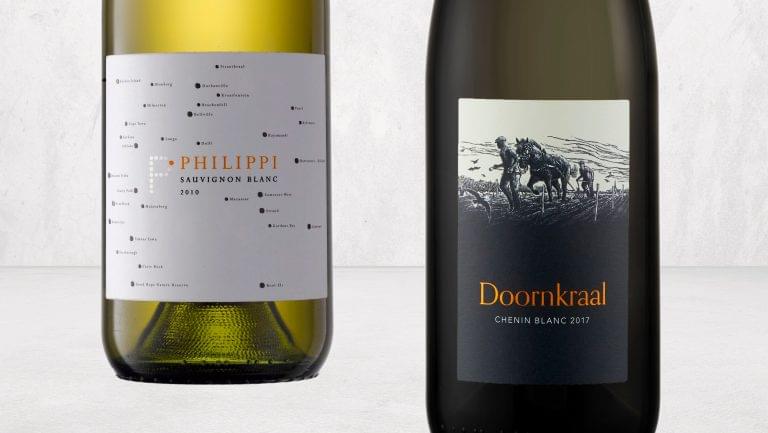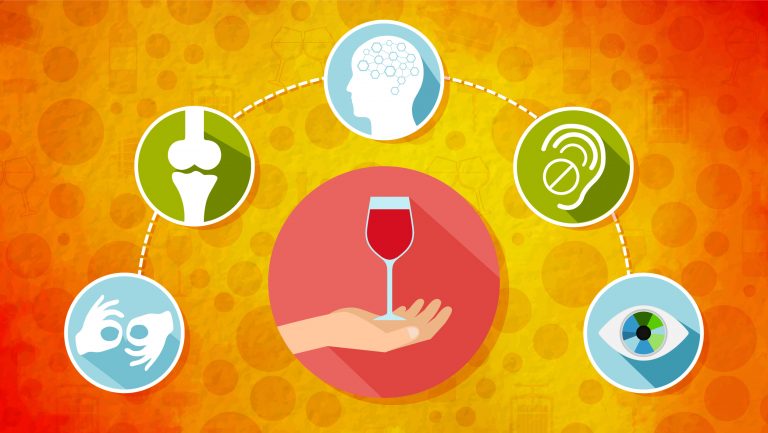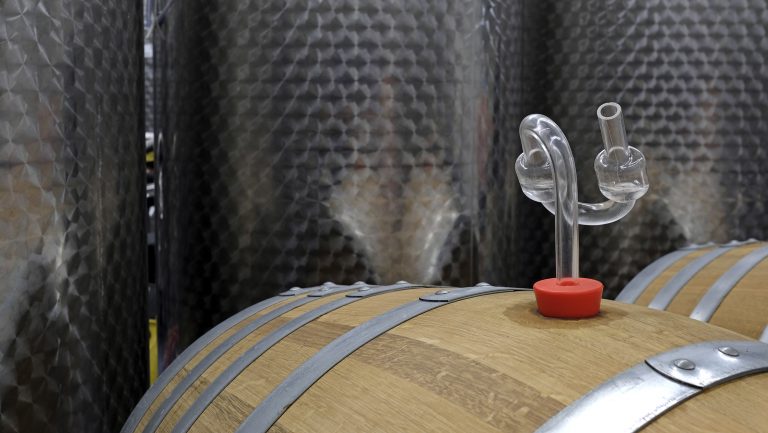The vines planted on the western slopes of Helderberg Mountain face toward Cape Town and mark the beginning of Stellenbosch and the manicured Cape Winelands of South Africa. While the mighty sandstone formation is geologically integral to South African wine, the vineyards on this slope loom over a patchwork of poverty-ridden settlements on the Cape Flats. These shanty villages, called townships, were formed during apartheid, the system of racial segregation that was the formal policy of the South Africa government from 1948 to 1994. Discriminatory practices during that time designated many urban areas as “white only,” forcing black and “coloured” (the South African term for someone of mixed race) South Africans into the Cape Flats.
Struggles over land in South Africa’s wine areas have been at the center of controversy recently. As the New York Times reported in March, the May 2018 takeover of a Stellenbosch vineyard owned by Stefan Smit—a white farmer—by black residents from the nearby Kayamandi township exemplifies the racial tensions that still divide the country, even decades after the end of apartheid.
Further west, the demographics of the Cape Flats remain similar to those in Kayamandi, with 2.5 million people living mostly in squalor. But black and mixed-race South Africans—though they make up more than 80 percent of the country’s population—are still working to carve out their space in an industry that exploited and excluded them for decades. Approximately 60 percent of the country’s 300,000-person wine industry workforce consists of employees from previously disadvantaged black and mixed-race groups, according to research conducted by the Western Cape Government in Cape Town. However, while they comprise more than half of the wine industry, these workers aren’t likely to be offered valued positions or leadership roles—and few have any business ownership stake or land equity.

Don’t miss the latest drinks industry news and insights. Sign up for our award-winning newsletters and get insider intel, resources, and trends delivered to your inbox every week.
Such disparities are among the reasons Graham Knox, a 45-year veteran of the South African wine industry, and Kate Jambela, a local housing developer, were driven to create The Township Winery in 2010. Their business model for the brand is a social justice–oriented grower cooperative that’s made up of grape growers, winemakers, and others from the Nyanga, Khayelitsha, and Philippi townships. Jambela, who identifies as “mixed South African race,” lives in a Cape Town suburb and is the winery’s majority owner. She was raised during apartheid and says she suffered under the system, but today she is a successful businesswoman who is committed to transforming South Africa’s wine industry. Speaking on behalf of those affected by inequality, Jambela says, “We want jobs—not just as laborers but as skilled employees with real opportunity.”
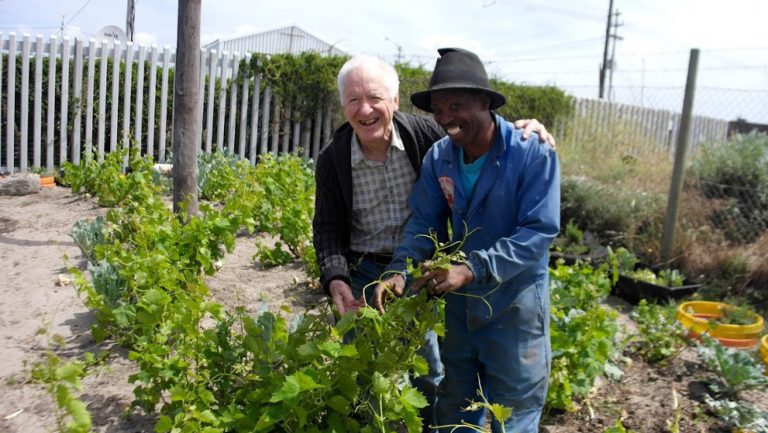
Creating True Shareholders
Michael Fridjhon, a visiting professor of the business of wine at the University of Cape Town’s Graduate School of Business, says that in the 25 years since the abolishment of apartheid in South Africa, “the industry has gone from making mainly junk to producing good and very good wine.” He notes, however, that success today is still hindered by certain attitudes involving apartheid. “We [South Africans] find it convenient to think there’s no connection between who we were then and who we are now,” he says, “but the wine industry still has to overcome the role alcohol played in the tearing of the social fabric of South Africa’s indigenous societies.”
The indigenous societies, explains Fridjhon, were negatively affected by the “dop” or “tot” system—a scheme in which winelands farm workers were paid part, or all, of their salary in wine. This practice was begun by European settlers centuries ago, and while it was outlawed in the 1960s, the ban wasn’t enforced until after the end of apartheid, explains Denise Stubbs, the managing director of Thokozani, a wine label in Wellington, South Africa. Among the ramifications of the practice, it’s believed by many to have contributed to widespread alcoholism and other health issues, including fetal alcohol syndrome, in the Western Cape. Stubbs grew up during apartheid in Pniel, a Western Cape settlement. She blames the dop system for the alcoholism that she says financially ruined her uncle, who was a wine farm laborer.
Before working in the wine industry, Stubbs had a successful career in procurement and project management at Mediclinic Southern Africa, a private hospital group in Stellenbosch. She shifted gears in 2002, when she was offered a chance to work toward the transformation of the industry that she watched nearly undo her community. David Sonnenberg, the owner of Diemersfontein Wine and Country Estate in Wellington, approached her about creating an empowerment arm in the form of a wine label in partnership with his company. Only 20 percent would be owned by Diemersfontein, with the remaining share owned by Thokozani, the new label.
The plan was for Thokozani, which launched in 2005, to have complete agency over its own business and to become a model for the government’s Broad-Based Black Economic Empowerment (B-BBEE) initiative, a legislative act that was introduced in 2003 and most recently amended in 2014, Stubbs explains. “It’s a pragmatic growth strategy that aims to realize the country’s full economic potential,” she says, “while helping to bring the black majority into the economic mainstream.” Today, Stubbs says, Thokozani is Level 1 B-BBEE compliant, which is the highest ranking a business can earn.
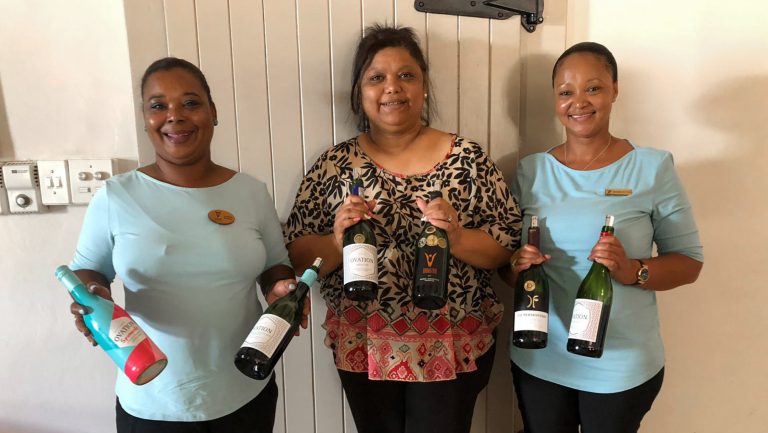
Thokozani is named for the Xhosa-language word meaning “celebration.” Xhosa is the name for both the indigenous people of South Africa and their language. When asked how she personally self-identifies, Stubbs is straightforward. “Look, I’m a laborer’s child,” she says. “Race will always be a part of my history and upbringing, but it does not change my attitude toward life.”
She notes that a great deal of effort went into creating the Thokozani brand—and that it wasn’t easy. “South Africa wanted to have black winemakers,” she says, “but they don’t happen overnight.”
It took Stubbs three years just to sell the idea to farm workers. Now, out of Thokozani’s 95 total employees, there are 65 worker-shareholders. They started their equity in the company by pledging 2 percent of their salary. The brand also gives equity in buildings and land assets, which means that shareholders have additional revenue streams, tied not only to wine sales. Dividends were paid out the last three years, rewarding the shareholders’ efforts. Stubb notes also that all the managers at Thokozani are women. The brand now produces 11,000 cases annually.
Stubbs says that an important part of her job is figuring out ways to successfully market the brand’s wines in South Africa and beyond. While Thokozani is sold under its namesake label in export markets like the U.S., France, Russia, and Germany, Stubbs markets its entire six-SKU wine portfolio under the more generic name Ovation in South Africa. This is in an effort to appeal to a broad range of national consumers, from the burgeoning demographic of black and mixed-race wine drinkers to the country’s more established wine-drinking white population.
The label produces a range of wines, from the semisweet, lightly sparkling Sauvignon Blanc Ovation Spumanté NV, which has served as a gateway wine for nondrinkers, to the brand’s best-selling product—its Ovation SMV, which is a Shiraz, Mourvèdre, and Viognier blend. Stubbs insists that she wants her company’s wines to be appreciated for their flavor and quality. “I don’t want anyone to buy our wine because I’m black,” she says, adding that she wants Thokozani to be given “a fair chance.”
Beating the Odds
Ntsiki Biyela, the proprietor of Aslina, a six-year-old wine label based in the Western Cape, is commonly acknowledged as South Africa’s first female black winemaker. Today she is an award-winning producer who is known worldwide, but she had to overcome countless odds to earn her standing in the country’s wine industry.
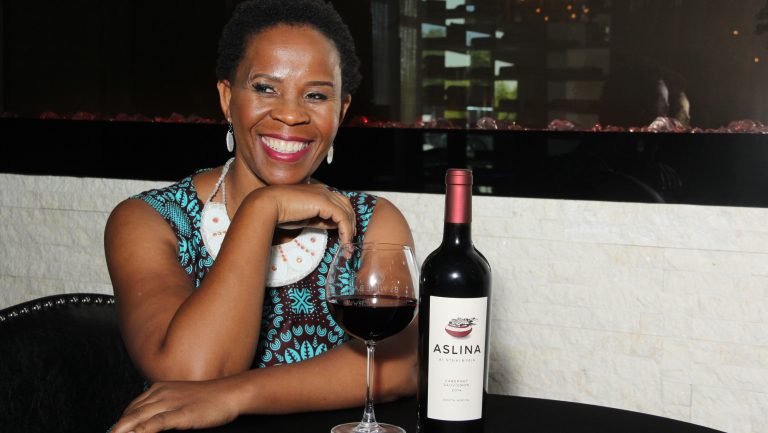
Biyela grew up in Mahlabathini, a rural village in the KwaZulu-Natal province. She’d never left the isolated area, let alone tasted wine, but a year after completing high school, she applied for a bursary, or grant, to attend university. At random, she was awarded a bursary to study winemaking at Stellenbosch University, starting in 1999. Fridjhon, of the University of Cape Town, had helped set up the scholarship Biyela was awarded. Its purpose was to support black and mixed-race individuals as they transitioned into the newly integrated—but still hostile—country.
While unsegregated enrollments at the university opened after apartheid’s fall in 1994, integration was a slow process. Biyela was one of only five black people in her class. Between the less than warm welcome and classes taught in Afrikaans—the language descended from that of the Dutch settlers, which Biyela didn’t understand—her early days were nearly impossible. “I cried every night,” she says. But Biyela persevered, and in 2003 she became one of the university’s first black viticulture and enology graduates.
When Fridjhon attended the premiere of Nigerian director Akin Omotoso’s 2018 documentary The Colour of Wine, in which his and Biyela’s stories were chronicled, he was reminded of the difficulties experienced by the first black students attempting to study winemaking at the university. “It was humbling and shocking to hear again how the apartheid era still ruled the academic environment at the time,” he says. “The institutions were inhospitable at best, which was a curtain-raiser to the inhospitable environment that awaited them in the Cape Winelands.”
Biyela explains that what got her through the challenges of that time “was knowing [that] if I don’t go through with the education, there is nothing waiting for me back home.” Today she produces upwards of 14,000 bottles annually of sought-after wine under her Aslina label. More than half her production is sold in the U.S., while the rest is exported to Europe and Japan or sold in South Africa. She’s well known for both her story and the quality of her products, but she says she’s ready to transcend her established reputation. “Being known and called the first black female winemaker has run its course,” she says. “What I want to be known as is a flippin’ good winemaker.”
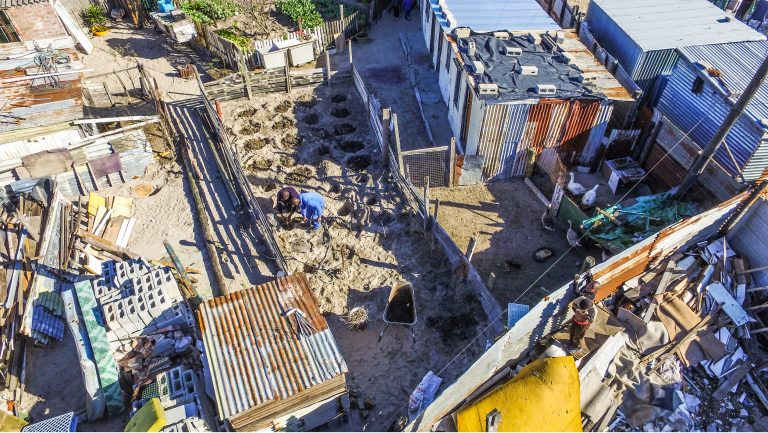
Vines Rise in the Cape Flats
The Township Winery’s Knox draws attention to the stark juxtaposition of poverty and wealth that still exists in South Africa, in particular in the area around Stellenbosch. “Leaving the airport,” he says, referring to Cape Town International, “on one side of the road there are shacks, [and on] the other side there are vineyards.” While postapartheid South Africa moves forward, the existence of townships in close proximity to the country’s flourishing wine industry makes clear that the road forward is long.
That’s one of the reasons The Township Winery’s work is so compelling. Knox and Jambela are bringing Winelands ecosystems and infrastructure directly into the Cape Flats. In Jambela’s primary career as a housing developer, she specializes in aiding township residents and helping them secure government funding to build permanent homes in place of shacks. Back in 2009, after working closely with the residents and becoming a trusted fixture in the community, Biyela had an idea: “I want to plant vines at these houses and start a winery in the townships.”
Jambela then proposed the initial concept to Knox. “Underneath the sand [in the Flats],” says Knox, “is a limestone ridge, which acts as a giant aquifer. It’s great for vineyards.” As a result of Knox and Jambela’s collaboration, three townships have begun modest vineyard plantings over the last three years. There are now 300 Sauvignon Blanc vines in Fezeka, 100 Muscat de Frontignan and 50 Muscat d’Alexandrie vines in Gugulethu, and 250 Shiraz vines in Mikpunt. The vines are managed at community gardens owned and operated by township residents. There are plans for three additional hectares to be planted at open spaces alongside a community center and two township high schools, where Knox volunteers time to educate students about farming. While the vines mature, The Township Winery sources fruit from existing vineyards. And for now, it partners with wineries around the Western Cape for its wine production. But the dream to open the residents’ exclusive, worker-owned winery means first cultivating brand awareness and building capital.
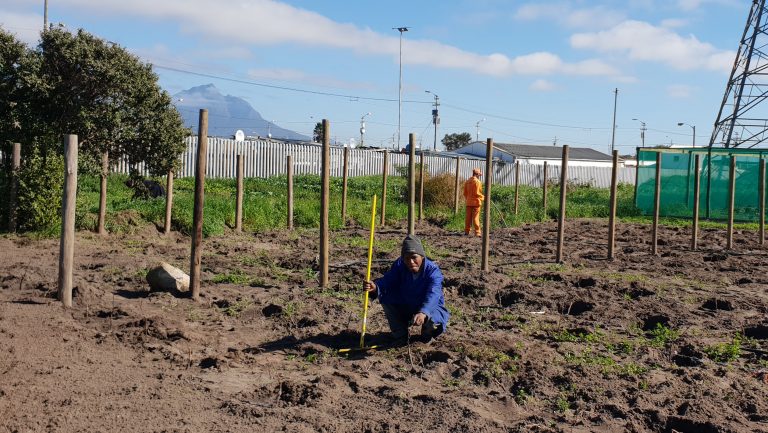
Knox explains that the townships would like to see more homegrown businesses—to attract tourism. The winemaking initiatives, he says, are aiding in shifting outside perceptions of the townships. At the Village House restaurant in Khayelitsha, the chef and owner, Thusile Celesi, is optimistic about the future. The Township Winery’s bottlings are offered at his establishment, which he refers to as a “restaurant in a shack,” alongside classic African dishes. “I am an African Xhosa person,” he says, “and these wines can have a big impact for my African culture.”
In the neighboring Philippi township, an ambitious development project called Philippi Village was completed in 2015. It transformed the grounds of a deserted cement factory into a hub of entrepreneurship, culture, and social interaction for the community. One main attraction is a series of refurbished cargo units called the Container Walk. Painted with vibrant colors, these metal vessels now house small businesses and workspaces for local artists. The project is designed to create business and commerce opportunities to boost the township economies while also providing a level of infrastructure to attract outside visitors. Knox adds that two of the adjoining units along the Container Walk will soon be the home and tasting room of The Township Winery.
Rising Over the Divide
Increasingly, people from disadvantaged communities in South Africa are turning to the country’s wine industry to find new opportunities that hold promise for a better future. And of these, two of the more established figures—Thokozani’s Stubbs and Aslina’s Biyela—are now seeking to help their wine brands transcend the ties to race. “I’m past that [association],” says Stubbs. “I need to [hear] people saying, I love the wine, the story is great, we want to buy the product.”
In addition to wanting Aslina’s legitimacy to be based solely on the wine’s merit, Biyela aspires to help pave the way for future township generations to enter the wine industry. She is on the board of directors for the Pinotage Youth Development Academy (PYDA), which trains township youth for work in the wine, tourism, and fruit sectors and assists them with job placement when they graduate. “Forty percent of PYDA is focused on personal development,” says Biyela. “We need to build the whole person.”
Numerous agents of change are emerging in South Africa today, and the role they play is essential to bringing more formerly disenfranchised people into South Africa’s wine industry. “The wine industry [from the] outside looks scary,” says Biyela. “But when you are on the inside, it’s not.” The hope is that over time, those who’ve been disadvantaged can create durable places in South African wine through new opportunities and support from the greater wine community.

Dispatch
Sign up for our award-winning newsletter
Don’t miss the latest drinks industry news and insights—delivered to your inbox every week.
Peter Weltman is a sommelier and entrepreneur based in San Francisco who explores native grapes from ancient sources. He writes for global food publications, gives speeches on wine activism, and creates immersive experiences about his movement, Borderless Wine. Find out where he’s reporting from next on Instagram.

